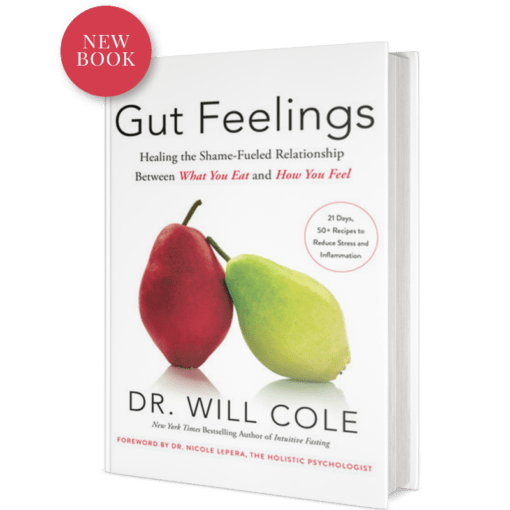Bacterial Dysbiosis: Why This Insidious Gut Problem Could Be The Root Of All Your Health Problems

You are less human than you think. In fact, one could say you are a sophisticated host for the microbiome! At 100 trillion, your gut contains 10x more beneficial microbes than your own human cells.
Each one of these various strands of bacteria, viruses, fungi, and parasites in your microbiome influence practically every area of your health including your hormones, digestion, and immunity - it even plays a role in your mental and emotional health! So much so, that researchers even refer to your gut as your “second brain” since your gut and brain were formed from the same tissue while you were developing in the womb. Studies also show that 50% of dopamine and 95% of serotonin are found in your gut.
A healthy microbiome is necessary for mental, emotional, and physical well-being. But there is one thing I see that gets in the way for a lot of people: Bacterial dysbiosis (an imbalance in your gut bacteria). In my telehealth functional medicine clinic, I’ve seen bacterial dysbiosis be both a trigger and a symptom of health problems. I actually see it so often that it was a main inspiration for my newest book, Gut Feelings, and played a role in the Gut Feelings quiz I created to help assess the health of your gut-feelings connection.
What is Bacterial Dysbiosis?
Your microbiome contains a vast, delicate ecosystem of microbes whose responsibility is to work together to keep you healthy. However, factors like stress, a poor diet, and overusing medications like antibiotics (that kill off good and bad bacteria) can wreak havoc on the natural balance. When this happens “bad” gut bugs start to outnumber the beneficial bacteria - aka bacterial dysbiosis.
Common Types of Bacterial Dysbiosis
With thousands of bacterial strains in your microbiome, there are also numerous ways your gut can become imbalanced depending on what particular microbes have grown out of control. These are the few types that I see more often than others and are common enough amongst the population to be considered their own conditions.
SIBO
SIBO is short for Small Intestinal Bacterial Overgrowth. Normally, when you are not eating - while you’re sleeping and in between meals - the migrating motor complex (MMC) pushes gut bacteria down into the large intestines. SIBO occurs when there is a dysfunction in the MMC, causing bacteria that are meant to migrate down instead grows up into the small intestines where it doesn’t belong.
This wayward bacteria ends up eating what you eat, fermenting the food in the wrong area, and causing uncomfortable symptoms like bloating and gas on one end and digestive problems like irritable bowel syndrome (IBS) and mental health problems like anxiety and brain fog on the other end.
Candida Overgrowth
Candida albicans is a type of fungus and the most common yeast found in your gut. It is normal for your gut to contain small amounts of candida but candida can quickly spiral out of control due to a decrease in the beneficial bacteria from antibiotics or a high-sugar diet, that keeps it in check. When candida overgrowth happens, it can also leave the door open for other opportunistic yeasts, bacteria, and parasites to pull rank and take over.
Dysbiosis Symptoms
Since your gut impacts so many different areas of your health, dysbiosis symptoms are not limited to gut dysfunction. Also, every person’s health case is unique so not everyone is going to experience the same dysbiosis symptoms however, these are what I see most often in my patients with bacterial dysbiosis:
- Acid reflux (1)
- Anxiety (2)
- Bad breath (3)
- Bloating (4)
- Constipation (5)
- Depression (6)
- Diarrhea (4)
- Fatigue (7)
- Gas (4)
- Poor cognitive function (brain fog) (8)
- Skin problems (acne, rashes, eczema) (9)
Read More: The 14 Best Herbs For Intestinal Inflammation
How do I know if I have Bacterial Dysbiosis?
Lab work is the first step to clinically determine in both functional and conventional medicine whether or not bacterial dysbiosis is a factor in your health case:
- SIBO breath test: Most often used to look for SIBO, this test measures the presence and amount of hydrogen and methane gas produced by the wayward bacteria in the small intestine. To complete the test, you’ll drink a solution containing sugar such as lactulose (most commonly used in SIBO tests), glucose, or xylose. If the bacteria are present, they will feed off the sugar and release hydrogen or methane gas.
- Comprehensive stool analysis: By analyzing a sample of your poop, the lab will be able to identify what bacteria, yeasts, and fungi are present and whether there is any overgrowth of unwanted microbe strains.
- Organic acids test: Similar to the hydrogen breath test, this test looks for the production of certain acids from negative microbe strains to determine whether there are any imbalances.
How to treat Dysbiosis
In conventional medicine, antibiotics are the first step in treatment to kill off any bacterial overgrowths, However, in functional medicine, we see this as counterintuitive since antibiotics kill off good bacteria as well - making it more difficult for your gut to restore healthy microbial balance.
Instead, we aim to treat the root cause of bacterial dysbiosis, starting with the foods we eat. Whatever we eat, the bacteria in our gut eats as well. In order to fuel the good bacteria, we need to be feeding them the right kind of nutrients for them to thrive and multiply. This is especially important when we remember just how much of an influence these bacteria have over our mental health since they communicate directly with our brain and produce mood-regulating neurotransmitters like serotonin and dopamine.
Thankfully, enterocytes - the cells that line your entire digestive tract - regenerate every two to three weeks. This is great news as studies have shown that changes in your microbiome can happen within as little as three days of making a dietary change. While everyone’s specific dietary needs are different, sugar, alcohol, and processed foods have been shown to be the most detrimental to good gut bacteria. Therefore, it is best practice to limit these as much as possible.
1. Sugar
Sugar is the preferred fuel source of bad microbes, specifically candida.
2. Alcohol
The super saboteur of the gut-feelings connection. Research (10) has shown that alcohol increases intestinal permeability and causes inflammation in your brain. Another study found (11) that drinking a few times a week was correlated with total lower brain volume in middle age and can lead to decreased memory, brain fog, and moodiness.
3. Processed and prepackaged foods
Most of these are filled with empty calories and none of the nutrients like fiber that your good gut bugs - the ones responsible for regulating your nervous system and producing neurotransmitters - need to thrive and multiply. One study (12) even showed that people who ate less than three sources of fruits and vegetables each day were 24% more likely to be diagnosed with an anxiety disorder.
After implementing dietary changes, my next step is to recommend herbal antimicrobials including oregano, cat’s claw, and pau d’arco that naturally target bad bacterial overgrowths. Then, we add in probiotics, postbiotics like butyrate, and binders like zeolite and activated charcoal.
How to Address your Emotional Health
Once you’ve addressed your gut health, the next step is to address the “feelings” side of your overall health. After all, the state of your emotional health directly influences your gut health.
This is because your gut and brain are connected by the enteric nervous system (ENS) - a division of the peripheral nervous system located inside the walls of your digestive tract. Your ENS communicates directly with your central nervous system 24/7. What does this mean? Every time you feel anxiety, shame, excited, or happy, it’s a sign that your gut and brain are on good communication terms.
With my patients that have bacterial dysbiosis, I like to implement mind-body practices like meditation and breathwork alongside the practical gut-focused recommendations in order to support the vagus nerve - the longest cranial nerve in your body involved in your gut-brain connection and your rest-and-digest response. As needed, I also recommend EMDR, somatic practices, and counseling around past trauma to support the gut-brain axis and your nervous system.
As one of the first functional medicine telehealth clinics in the world, we provide webcam health consultations for people around the globe.
Start Your Health Journey Today
FUNCTIONAL MEDICINE CONSULTATIONS FOR PEOPLE AROUND THE WORLD
References:
- Haworth, Jordan J et al. “The prevalence of intestinal dysbiosis in patients referred for antireflux surgery.” Surgical endoscopy vol. 35,12 (2021): 7112-7119. doi:10.1007/s00464-020-08229-5
- Yang, Beibei et al. “Effects of regulating intestinal microbiota on anxiety symptoms: A systematic review.” General psychiatry vol. 32,2 e100056. 17 May. 2019, doi:10.1136/gpsych-2019-100056
- Mogilnicka, Izabella et al. “Microbiota and Malodor-Etiology and Management.” International journal of molecular sciences vol. 21,8 2886. 20 Apr. 2020, doi:10.3390/ijms21082886
- Sorathia, Sufian J., et al. “Small Intestinal Bacterial Overgrowth.” StatPearls, StatPearls Publishing, 20 October 2022.
- Ohkusa, Toshifumi et al. “Gut Microbiota and Chronic Constipation: A Review and Update.” Frontiers in medicine vol. 6 19. 12 Feb. 2019, doi:10.3389/fmed.2019.00019
- Clapp, Megan et al. “Gut microbiota's effect on mental health: The gut-brain axis.” Clinics and practice vol. 7,4 987. 15 Sep. 2017, doi:10.4081/cp.2017.987
- Du Preez, S et al. “A systematic review of enteric dysbiosis in chronic fatigue syndrome/myalgic encephalomyelitis.” Systematic reviews vol. 7,1 241. 20 Dec. 2018, doi:10.1186/s13643-018-0909-0
- Roy Sarkar, Suparna et al. “Probiotics protect against gut dysbiosis associated decline in learning and memory.” Journal of neuroimmunology vol. 348 (2020): 577390. doi:10.1016/j.jneuroim.2020.577390
- Widhiati, Suci et al. “The role of gut microbiome in inflammatory skin disorders: A systematic review.” Dermatology reports vol. 14,1 9188. 28 Dec. 2021, doi:10.4081/dr.2022.9188
- Purohit, Vishnudutt et al. “Alcohol, intestinal bacterial growth, intestinal permeability to endotoxin, and medical consequences: summary of a symposium.” Alcohol (Fayetteville, N.Y.) vol. 42,5 (2008): 349-61. doi:10.1016/j.alcohol.2008.03.131
- Immonen, S., Launes, J., Järvinen, I. et al. Moderate alcohol use is associated with decreased brain volume in early middle age in both sexes. Sci Rep 10, 13998 (2020). https://doi.org/10.1038/s41598-020-70910-5
-
Low fruit and Vegetable Intakes and Higher Body Fat Linked to Anxiety Disorders. International Journal of Environmental Research and Public Health. DOI: 10.3390/ijerph17051493
View More At Our Store
Purchase personally curated supplements
and Dr. Will Cole’s books!

The information on this website has not been evaluated by the Food & Drug Administration or any other medical body. We do not aim to diagnose, treat, cure or prevent any illness or disease. Information is shared for educational purposes only. You must consult your doctor before acting on any content on this website, especially if you are pregnant, nursing, taking medication, or have a medical condition.
Our content may include products that have been independently chosen and recommended by Dr. Will Cole and our editors. If you purchase something mentioned in this article, we may earn a small commission.

BY DR. WILL COLE
Dr. Will Cole, DNM, IFMCP, DC is a leading functional medicine expert who consults people around the globe, starting one of the first functional medicine telehealth centers in the world. Named one of the top 50 functional and integrative doctors in the nation, Dr. Will Cole provides a functional medicine approach for thyroid issues, autoimmune conditions, hormonal imbalances, digestive disorders, and brain problems. He is also the host of the popular The Art of Being Well podcast and the New York Times bestselling author of Intuitive Fasting, Ketotarian, Gut Feelings, and The Inflammation Spectrum.

Gut Feelings
Healing The Shame-Fueled Relationship
Between What You Eat And How You Feel



